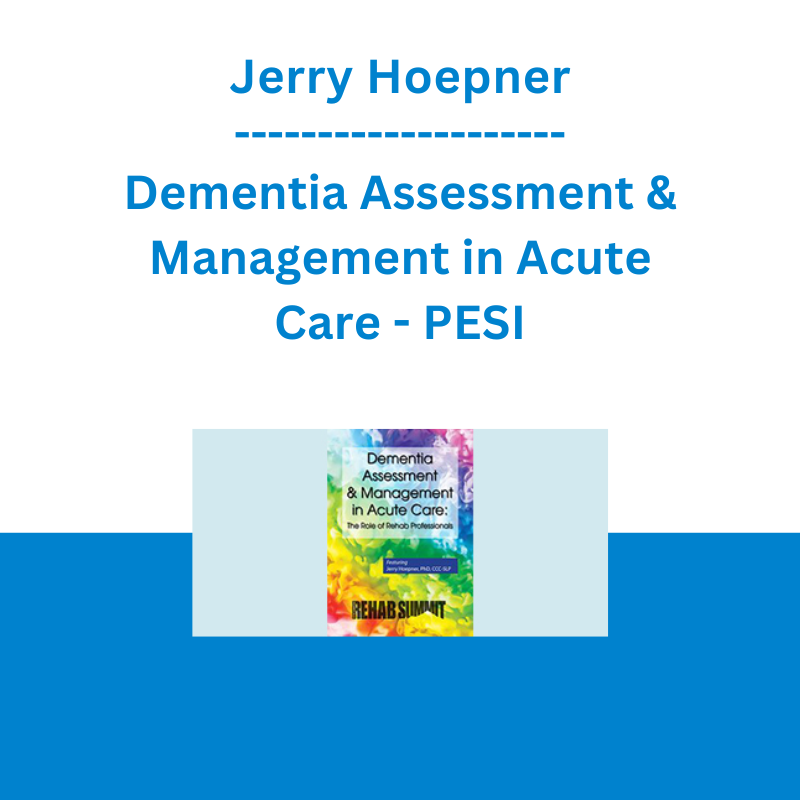*** Proof of Product ***
Exploring the Essential Features of “Jerry Hoepner – Dementia Assessment & Management in Acute Care: The Role of Rehab Professionals – PESI”
Speaker: Jerry K Hoepner, PhD, CCC-SLP
Duration: 2 Hours
Format: Audio and Video
Copyright: Jul 26, 2019
Media Type: Digital Seminar
Description
Rehabilitation professionals in acute-care encounter individuals with dementia who reside in home, assisted-living, or long-term care prior to admission. Direct therapist roles may be limited to consultations, assessments, and/or swallowing, mobility, and self-cares. Case management typically falls upon social workers and nurse case-managers but the entire rehab team has a role in supporting safety while the individual is in acute-care. Hospital cognitive-status is likely much different than status in typical living environment and further complicated following admissions for falls, infections, dehydration, malnutrition, and medication management. We will discuss factors that contribute to making decisions about our roles in assessment and management.
Speaker
Jerry K Hoepner, PhD, CCC-SLP
Jerry Hoepner, PhD, CCC-SLP, is an assistant professor in the Communication Sciences and Disorders Department at the University of Wisconsin – Eau Claire. In that capacity, he teaches coursework in neuroanatomy, dysphagia, aphasia, acquired cognitive disorders, and counseling. Dr. Hoepner received his MS from the University of Wisconsin – Eau Claire and his PhD from the University of Wisconsin – Madison in Communication Sciences and Disorders. His current research examines the role of partners in supporting the success of everyday interactions of individuals with traumatic brain injury, aphasia and dementias. A second line of research examines teaching pedagogies and learner responses. Clinically, Dr. Hoepner specializes in the use of routines to reduce demands on working memory and executive functions. He co-facilitates Aphasia Camp and the Chippewa Valley Aphasia Group.
Speaker Disclosures:
Financial: Dr. Jerry Hoepner is an assistant professor and researcher at the University of Wisconsin Eau Claire. He receives a speaking honorarium from PESI, Inc. He has no relevant financial relationships with ineligible organizations.
Non-financial: Dr. Jerry Hoepner is on the board of directors for the Chippewa Valley Aphasia Group.
Objectives
- Summarize the key collaborators and roles of other disciplines in the management of persons with dementias in an acute care context.
- List at least three factors that contribute to decisions about our level of involvement (consultatory or direct care) for persons with dementia in acute care contexts.
- Incorporate potential elements of assessment batteries, which balance impairment-based diagnostic elements with non-standardized, observational elements that foster insights into diagnosis and treatment planning.
Outline
Key players (disciplines) in an acute care context and their roles.
Roles of social workers and case managers in discharge planning.
Role of the system/team in managing behaviors, safety, and participation while an individual with dementia is hospitalized.
Key issues related to presence or lack of diagnosis, behavioral concerns and related management issues, swallowing concerns – meeting nutritional intake needs, cognitive effects on swallow, and/or physiological safety; follow through with precautions, counseling.
Screening measures versus standardized assessment batteries that are sensitive to identifying specific types of dementia.
Non-standardized and observational assessments that provide more information about functional performance and provide direction for treatment planning.
Target Audience
- Physical Therapists
- Physical Therapist Assistants
- Occupational Therapists
- Occupational Therapy Assistants
- Athletic Trainers
- Speech Language Pathologists
Please see the full list of alternative group-buy courses available here: https://lunacourse.com/shop/










 Bonnie Weiss - Beyond Eating Audio Course
Bonnie Weiss - Beyond Eating Audio Course